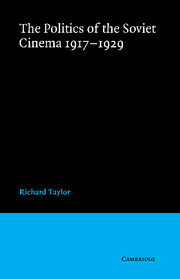Book contents
- Frontmatter
- Contents
- Preface
- Acknowledgements
- Note on transliteration
- Abbreviations
- 1 The pre-history of the Soviet cinema
- 2 The Bolsheviks, propaganda and the cinema
- 3 Revolution and Civil War
- 4 The disorganisation of organisation: the early twenties
- 5 The organisation of disorganisation: the later twenties
- 6 The Party takes control
- 7 Theory and film
- 8 Conclusions
- Notes
- Bibliography
- Index
3 - Revolution and Civil War
Published online by Cambridge University Press: 07 October 2011
- Frontmatter
- Contents
- Preface
- Acknowledgements
- Note on transliteration
- Abbreviations
- 1 The pre-history of the Soviet cinema
- 2 The Bolsheviks, propaganda and the cinema
- 3 Revolution and Civil War
- 4 The disorganisation of organisation: the early twenties
- 5 The organisation of disorganisation: the later twenties
- 6 The Party takes control
- 7 Theory and film
- 8 Conclusions
- Notes
- Bibliography
- Index
Summary
Revolution releases all the forces that have hitherto been fettered and drives them up from the depths to the surface of life.
Lenin, 1920.The Bolsheviks needed to use propaganda and they chose the cinema as their principal weapon in the campaign to win the minds of the masses. But first they had to win control of the cinema, or what remained of it, in as far as that was possible. Just as the normal administrative structure of the Soviet state had been disrupted, so the production and distribution system of the existing cinema network in the R.S.F.S.R. had crumbled under the combined strain of political and economic pressures. It had thus become virtually impossible to realise the government's policy through conventional channels.
It was partly for this reason that the new government decided against the immediate and wholesale centralised nationalisation of the film industry, although in the chaotic conditions of the months following the October Revolution they had little power to do otherwise. Centralised organisations were established fairly rapidly but in the early stages their existence was largely confined to paper; Soviet power was not yet strong enough to realise its ambitions.
- Type
- Chapter
- Information
- The Politics of the Soviet Cinema 1917–1929 , pp. 43 - 63Publisher: Cambridge University PressPrint publication year: 1979

